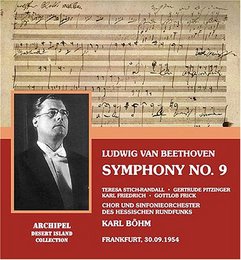| All Artists: Ludwig van Beethoven, Recorded Sound, Karl Böhm, Sinfonie-Orchester des Hessichen Rundfunks, Teresa Stich-Randall, Karl Friedrich Title: Beethoven: Symphony No. 9 Members Wishing: 0 Total Copies: 0 Label: Archipel Release Date: 4/26/2005 Album Type: Import Genres: Special Interest, Classical Styles: Historical Periods, Classical (c.1770-1830), Symphonies Number of Discs: 1 SwapaCD Credits: 1 UPCs: 675754826628, 4035122401615 |
Search - Ludwig van Beethoven, Recorded Sound, Karl Böhm :: Beethoven: Symphony No. 9
 | Ludwig van Beethoven, Recorded Sound, Karl Böhm Beethoven: Symphony No. 9 Genres: Special Interest, Classical
|
Larger Image |
CD Details |
CD ReviewsDont' be frightened off by the MONO sound, this is very fine Alan Majeska | Bad Axe, MI, USA | 12/06/2005 (5 out of 5 stars) "Karl Bohm (1894-1981) recorded Beethoven's Ninth Symphony at least 5 times: with the Dresden State Orchestra (Iron Needle, 1941); this recording, from the Hessian Radio Orchestra (Archipel, September 1954); with the Vienna Symphony (Philips, 1960 - hard to find on CD now); and with the Vienna Philharmonic (DG, 1970; DG, 1980, in digital sound). There may be other recordings of which I am unaware, but it is obvious Bohm wanted to do right by the piece, having often performed it, and recorded it in several different decades of his life.
Do not be frightened off by the MONO sound of Archipel's recording: this is very fine! Karl Bohm conducts with authority, and the Hessian Radio Orchestra plays very well. Bohm is flexible with tempos and nuances at key points. While listening to this, I thought: this is REALLY GOOD; SO SATISFYING. There is a little hiss in the sound, but the MONO sound is wide ranging, and there is natural balance of instruments in the soundstage. There are some problems: In my copy, each movement gets a separate track, but track 4 doesn't start until just before the Bass recitative which starts the choral part of the movement! So track 3 is all of Movement III, plus the first 6 minutes or so of IV! If you can tolerate this glitch, don't let this stop you from obtaining a great recording of Beethoven's 9th Symphony. Perhaps future copies of this disc will have this corrected. I advise anyone who likes Karl Bohm and Beethoven's 9th to get each of the above mentioned recordings if you can find them. The Iron Needle 1941 recording sound old, but is acceptable. You have to be able to tolerate 78 RPM sound to enjoy it: there is surface noise. I would also advise getting each of the Bohm's Vienna Philharmonic recordings; the 1980 is rather more massive, with slower tempos than the earlier recordings, in IV, but still worth hearing. For other conductors, there are Bernstein/Vienna (DG); Karajan/Berlin (DG, 1962); Szell/Cleveland (Sony); Furtwangler/Philharmonia (Tahra, Lucerne 8/1954, live - very good mono sound, but with a drop in pitch for a millisecond in the Adagio section of IV); Weingartner (Naxos, 1930s - 78 RPM sources but in improved, remastered sound); and Tennstedt/Philharmonia (BBC, live recording)." |

 Track Listings (5) - Disc #1
Track Listings (5) - Disc #1